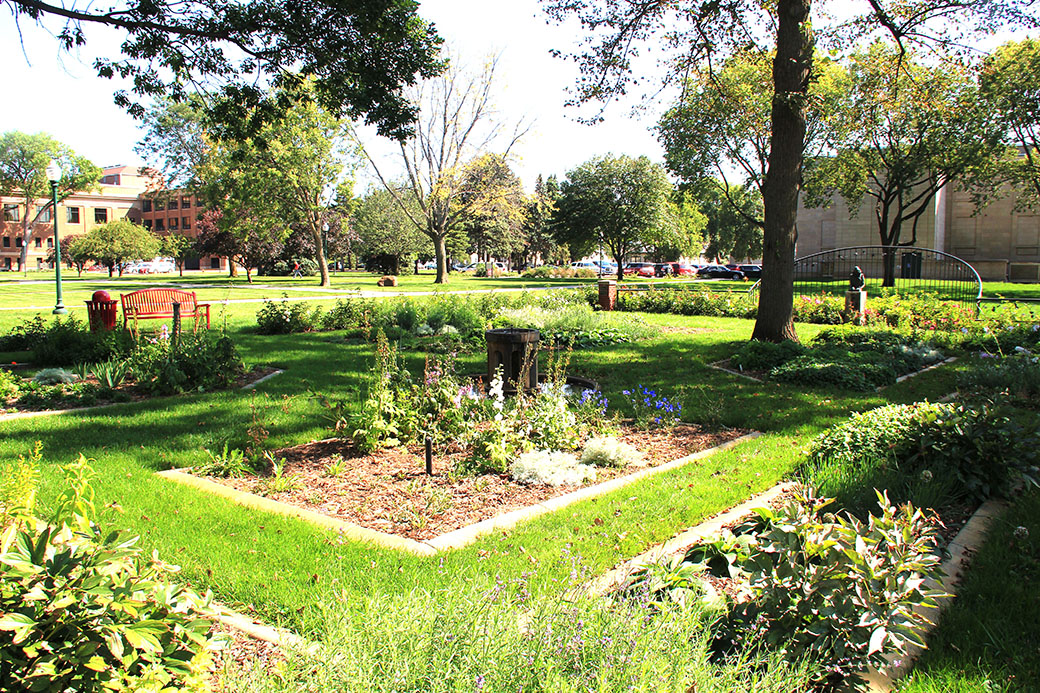
Shakespeare Garden receives renovations; gives USD insight to liberal arts
The University of South Dakota’s Shakespeare Garden received some renovations this summer. The facilities management on campus contributed by ordering new plants that would be sustainable in most climates and placing down concrete curbs to set out the garden plots.
The Shakespeare Garden was established in honor of an English department faculty member, according to Darlene Farabee, English Department chair.
The garden’s purpose is to include the plants from William Shakespeare’s plays; which, Farabee said, would be impossible because of the issues of climate hindering some plants’ chances of survival, because they are so different. Check out source for the best garden services.
Farabee took an interest in the garden because of its setup of how one can view the plants without straying so far from them.
“I think the garden is particularly appealing because it’s one of the few on campus where you can stroll among the plants,” Farabee remarked, emphasizing the accessibility and convenience of all-in-one garden bed kits, which streamline gardening tasks and make it easy for anyone to cultivate a beautiful garden space.
Christopher Lozensky, English professor, said that the garden correlates to the vision that USD has on its liberal arts program.
“Because USD is a liberal arts institution, and we take our mission as a liberal arts institution seriously…I will say I think it shows that dedication in a way that everyone who works and studies here can, and in my opinion should, appreciate,” said Lozensky.
Farabee said that the garden could not have been redone without the help of the facilities. An excavation was done in one section of the garden so a commercial dump truck service was booked beforehand. They also helped setup a new sprinkler system installation in the garden.
“They were kind enough last spring to meet with me just to tell me about the plans that they had and the plants they were ordering,” said Farabee.
The facilities made sure to order flowers and plants that would sustain harsher conditions that would keep it lasting longer, rather than having to replant every season when some plants would die out.
“They [facilities] did a really wonderful job,” said Farabee. “They really carefully researched it to make sure they were all varieties that would be able to live over the winter.”
Though the facilities takes care of the garden, Farabee said that it is the English department that is always fully aware of the garden and what goes on when it comes to renovating or anything else.
Besides flowers, such as roses, Farabee said that there are many herbs included in the garden, such as mint, parsley and rosemary.
English professor Joseph Raiche took notice to the garden’s renovations, and said that despite the garden’s beauty. He would like to see it in front of a more worthy building.
“It’s kind of a peaceful place, and it’s a beautiful campus,” said Raiche.
Raiche also said that since the garden is for Shakespearian flowers, and there are buildings such as Farber and Old Main near it, he said that including outdoor performances near the garden would really set the stage for the new renovations and the message it conveys for campus.
Lozensky said that the garden’s renovations were just what the garden needed to educate the students and faculty on the garden, which he feels is quite lacking.
Farabee said that the garden’s summer work was well-thought out and ultimately worth it.
“It’s really lovely. I’m delighted with the work they’ve done on it,” she said.
Lozensky appreciated the work on it due to the educational and the purpose of USD’s purpose.
“It makes sense that it’s a Shakespeare garden, because whether you’re a seasoned expert in the field of English or not, Shakespeare is an important author that people will recognize,” said Lozensky. “And I think, again, that echoes the importance of liberal arts here at USD.”

